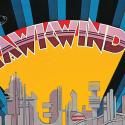It’s a sign of Bruce Springsteen’s contribution to the canon of American rock music that we no longer spend time comparing his music to others. Springsteen’s problem tends to be living up to different versions of himself.
It seems like every new album is hailed as a return to somebody’s favourite Springsteen, whether it’s acoustic confessional, balls-out stadium rock or great American storyteller. From what had been trailed of Wrecking Ball I was anticipating the return of the angry man-of-the-people, which is probably my favourite. Wrecking Ball has been billed as Springsteen's response to the effects of the global financial crisis, the soundtrack to the gulf between Occupy Wall Street and the big banks. Titles like “Shackled and Drawn”, “Easy Money” and “This Depression” plainly state its case, much as The Rising was a response to 9/11.
Yet it could all have gone so horribly wrong. You’ve probably heard “We Take Care of Our Own”, the album’s singalong opening hymn of solidarity. As statements of intent go it’s lyrically simple. Backed with uplifting piano, it's a bit Springsteen-by-numbers but, taken in context, introducing a mix of stylistic elements that come together to serve the album’s central themes, it’s unforgettable.
Oh, make no mistake: with lines like “when your whole world comes tumbling down all those fat cats will just think it’s funny” this album certainly presents an anger and political awareness that – dare I say it – makes the Obama-endorsing antics of Working on a Dream look like mere cheerleading. But it’s hopeful too, full of big choruses framed with gospel singalongs and elements of rootsy Americana learned from 2006’s Seeger Sessions material. “Death to My Hometown” is fighting talk presented as giddy celtic punk, and while a Springsteen-penned rap verse sounds horrendous on paper, Michelle Moore’s softer vocals and the song’s percussive loops deliver its redemptive message in a way that he has never attempted before. Purists will hate it – I disagree.
“I’ve seen champions come and go, so if you’ve got the guts mister… bring on your wrecking ball.” The title track might be the song that brought down the old Giants Stadium in New York, but you could be forgiven for thinking that it's also a shoutout to a Bruce Springsteen who, almost 40 years since his debut, is as relevant, on-message and as willing to take risks as ever. And as a saxophone solo from the late Clarence Clemons reminds us, there’s nothing wrong with looking back.
Overleaf: "Wrecking Ball" performed live














Add comment